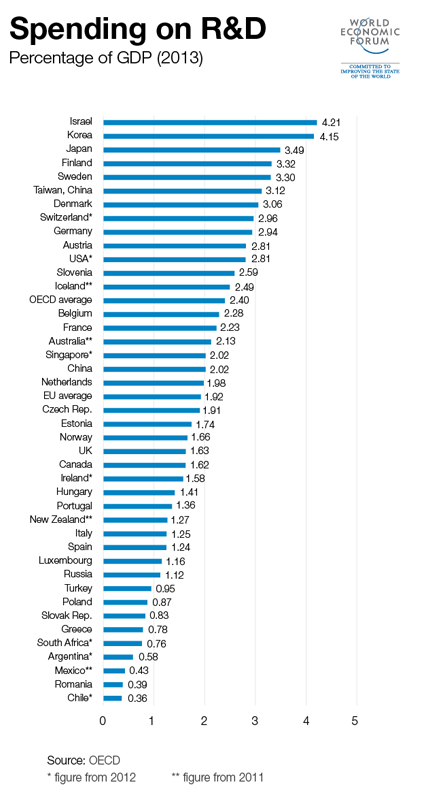Which countries spend the most on research and development?

Research and development is the bedrock of innovation. A big investment in R&D indicates a thriving and entrepreneurial industrial spirit, and figures from the Organisation for Economic Cooperation and Development (OECD) highlight the countries spending the most – and least – on this important driver of economic growth, which covers three activities: basic research, applied research and experimental development.
Israel and Korea are the biggest spenders on R&D at 4.21% and 4.15% of GDP respectively. Japan, Finland and Sweden complete the top 5.
Germany and the United States have similar levels of R&D investment at just under 3%, and while China has built its economy making products designed and developed overseas, its research spend is rapidly catching up at 2% of GDP.
Of the OECD member nations, Chile spends the least on R&D at 0.36%, with Romania and Mexico only slightly ahead.
If you’d like to learn more, read What is government’s role in sparking innovation? and 10 ways countries can improve their competitiveness.
To keep up with the Agenda subscribe to our weekly newsletter.
Author: Paul Muggeridge is Head of Content at Formative Content.
Image: Scientists work in the Human and Molecular Genetics Center Sequencing Core at the Medical College of Wisconsin. REUTERS/Jim Young
Don't miss any update on this topic
Create a free account and access your personalized content collection with our latest publications and analyses.
License and Republishing
World Economic Forum articles may be republished in accordance with the Creative Commons Attribution-NonCommercial-NoDerivatives 4.0 International Public License, and in accordance with our Terms of Use.
The views expressed in this article are those of the author alone and not the World Economic Forum.
Stay up to date:
Innovation
Forum Stories newsletter
Bringing you weekly curated insights and analysis on the global issues that matter.
More on Economic GrowthSee all
Rishika Daryanani, Daniel Waring and Tarini Fernando
November 14, 2025








